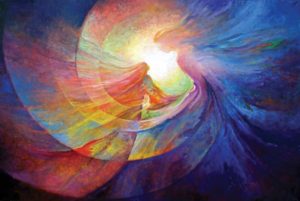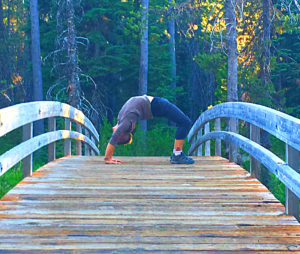My work in the world consists of one singular focus: love. I believe that love is the reason we are here on this planet, and our life’s purpose is to discover the love within us as we cultivate love outside of us.
So I never had any interest in becoming a life coach, and instead sought to become a love coach. After all, how we love is how we live. Love is the root cause of our happiness, and lack of love is a root cause of our pain.
If you look deeply at the root of all human activities, you will see it as a search for love. For example, people think they want fame, but because we all want to be accepted by others, fame is just one route towards that internal feeling of validation. People think they want to be thin or strong or good-looking, but really, they just want to love and accept themselves as they are.
The traditional Wheel of Life
And so, I realized I would need to develop my own “Wheel of Love” as a response to what most life coaches use in their practice, the Wheel of Life. The Wheel of Life may vary from coach to coach, but all in all, it tends to divide up our lives into a set of distinct categories, and ends up looking something like this:
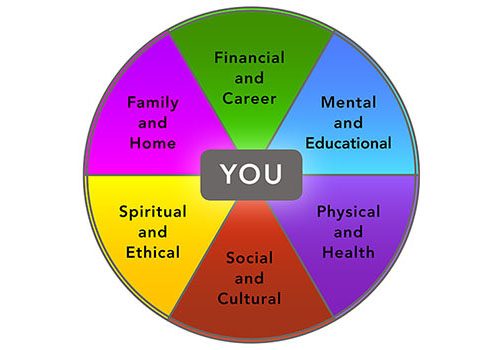
In completing your wheel of life, you would typically rate on a scale of 1-10 how fulfilled you are in these areas. So a filled out wheel of life might look something like this:
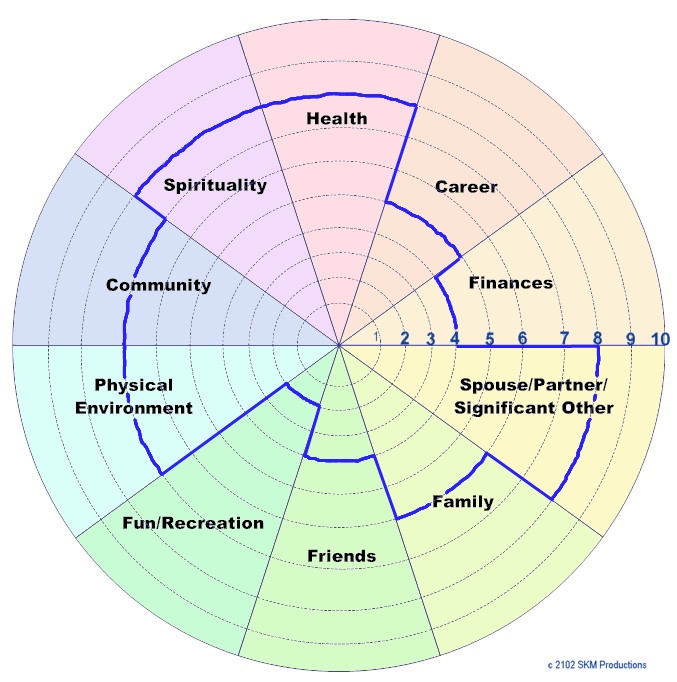
Your coach would then focus on areas that you are most deficient and help you fill in those gaps.
But whenever I looked at the wheel of life, I had a number of objections. First off, everything is so intimately connected. Our finances are directly related to our career, and our career is directly related to our environment and where we spend most of our time. Also, while we might intuitively want to divide our life up into these categories, do any of them actually make us happy? Or is it too entrenched in our materialistic, capitalistic, individualistic society that says you are supposed to have 2.3 kids, a house, a white picket fence, a dog, a 401k, and a bit of free time to exercise and watch football on the weekend?
One of my favorite phrases I teach people is, “we spend most of our lives climbing up a ladder to get over a wall. By the time we reach the top, we realize it is the wrong wall.” Many people spend their entire life seeking money and material comforts, only to find out it doesn’t actually make them happy. The actor Jim Carrey is quoted to have said, “I think everybody should get rich and famous and do everything they ever dreamed of so they can see that it’s not the answer.”
“The answer” to lasting fulfillment, joy, and ease isn’t simply getting what we want, but also making others happy and strengthening our connection to others and the world. True meaning comes from love and discovering the love that lies within each and every one of us.
A New Paradigm
So I realized we needed a new way to look at the wheel of life and thought I would use my background in yoga and integral studies to do that. I actually got my Master’s Degree in East-West Psychology at the California Institute of Integral Studies in San Francisco. The term, “integral,” has changed a lot throughout history, from Sri Aurobindo’s Integral Yoga to Ken Wilbur’s Integral Theory. While there are many ways to think about integral health, one of its biggest innovations is the understanding that we have both an external world to improve and an internal world to shore up as well. Not only that, but we cannot ignore that there is individual wellness and collective wellness, both are interconnected.
So a common model to reflect these insights is the four-quadrant model, as shown below:
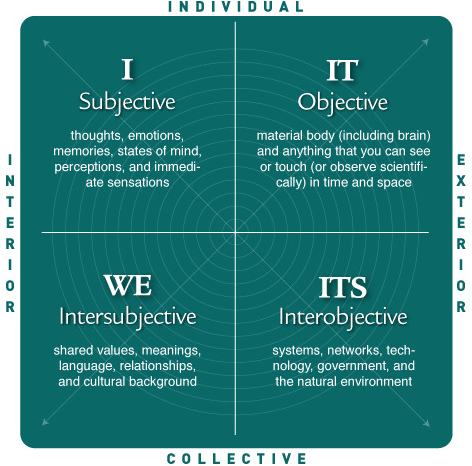
Much modern medicine is focused overly on the upper right quadrant, which implies there is some kind of impartial objectivity. Science largely views the body as a machine, a set of mechanical processes that often need a bit of “tweaking” through pharmaceutical intervention in order to fix. It is important to note that this approach is valid, but incomplete, and our observations about the body are vastly different than the actual lived experience of being in a body.
So over the years I have thought for a long time about how to integrate integral psychology with love and life coaching. And after a few tweaks, I have come up with what I call “The Wheel of Love,” which looks at both our individual wellness and our collective wholeness as key factors to the love, connection, and belonging that create true and lasting happiness.
Introducing: The Wheel of Love
It is not perfect, but nothing is. Here, to me, is the true wheel we should think about filling in:
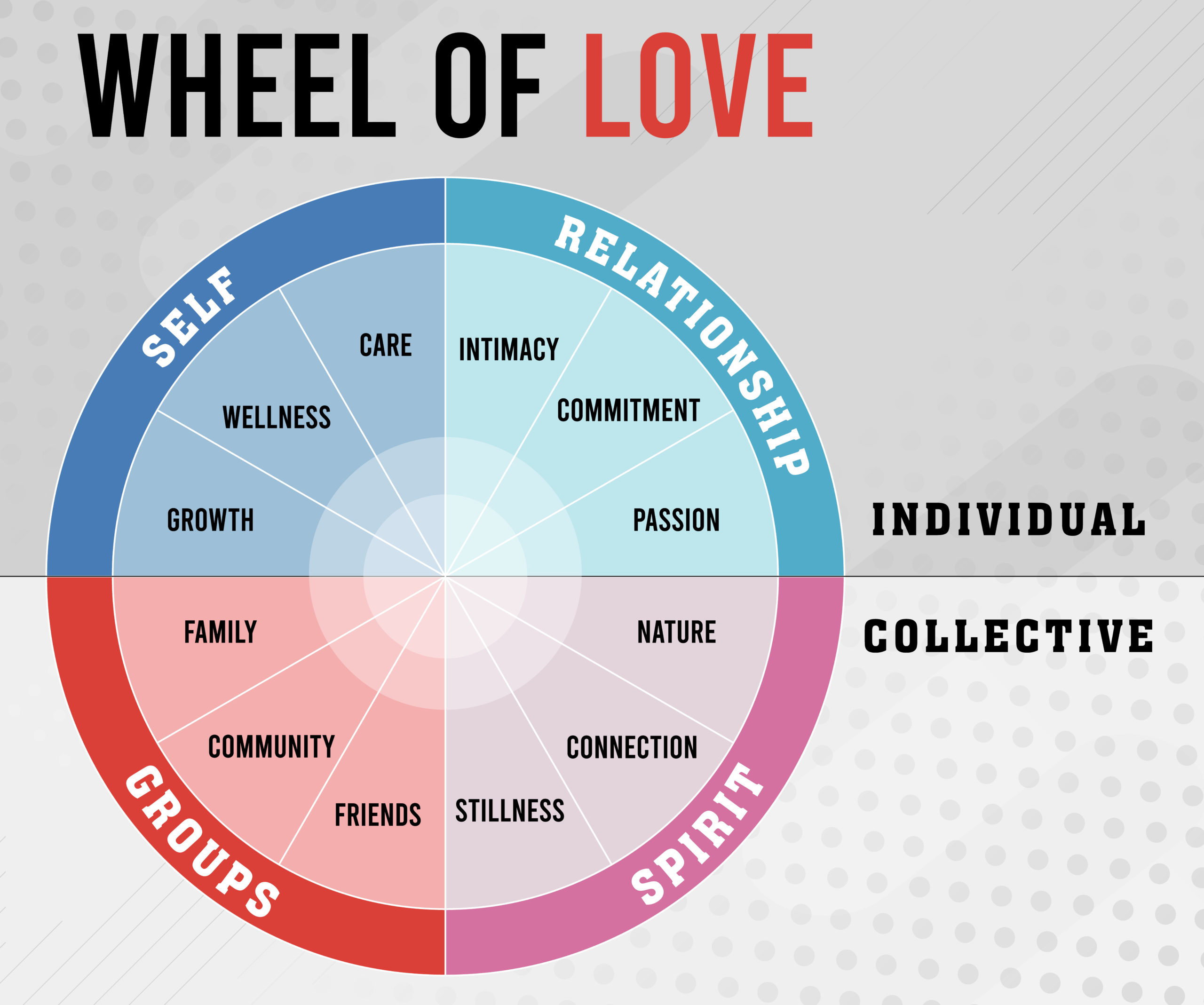
Here we have twelve parameters, four quadrants, as well as an emphasis on whether we are talking about healing on an individual level, including one on one relationships, or on a collective level. I also have a whole quadrant on our connection to spirit, or God, or the Universe, because that to me is as fundamental as our need for food and water.
When I started coaching clients to bring more love into their lives, I realized there is a myriad of ways to do that. How well do you love yourself? Your family? Your friends? Are you loving this Earth or letting God love you?
The Intake Process
These are just some of the questions I might ask during the intake process as we go through each parameter one by one. You can do this right now, in fact, by asking yourself any of the following questions:
- Wellness
- How well do you feel on a day-to-day basis?
- How often do you exercise your body?
- How often do you work your mind?
- Care
- How often do you take care of your own needs?
- Do you love yourself?
- How well do you sleep, eat, and drink water?
- Growth
- Are you constantly learning new things?
- Are you seeing a therapist, reading books, listening to podcasts?
- How often do you learn something new?
- Intimacy
- Do you feel close to an intimate partner?
- Do you have someone you can emotionally confide in?
- How comfortable are you with vulnerability?
- Passion
- How satisfying is your sex life?
- How attracted are you to your intimate partner?
- How often do you try new or adventurous things?
- Commitment
- Are you afraid of commitment?
- Have you found your life partner, soulmate, or twin flame?
- How comfortable are you with making plans for the future with someone?
- Friends
- Do you have a close friends group?
- Are you part of any group that meets regularly?
- Do you have someone you can turn to in challenging times?
- Family
- How is your relationship with your mother and father?
- If you have kids, are you struggling or thriving with parenting?
- Do you have extended family that you talk to?
- Community
- Are you part of a larger group?
- Have you resolved and connected to your heritage?
- Do you regularly volunteer or help out those in need?
- Connection
- Do you feel connected to something greater than yourself?
- Do you have a practice that helps you feel connected?
- Do you feel the presence of a God, Goddess, The Divine, Spirit, or anything else?
- Nature
- How often do you go outside?
- Do you hike, bike, or have outdoor activities you enjoy?
- Do you ever go on retreat or camping?
- Stillness
- Do you regularly find time to just be?
- How stressful is your life?
- Do you spend any time going beyond the continuous movement of thinking?
These are just some of the questions to get started on filling out your wheel of love. As you can tell, love is interdisciplinary; it covers and infuses every aspect of our experience. Love is not just romance but community and social justice. Love is not just one’s own immediate family, but our connection to everything and to humanity at large. We can love ourselves, others, and the Earth.
If you are looking to fill up your love, feel free to learn more about my coaching and schedule a free consultation. I’m here for you if you need me.

